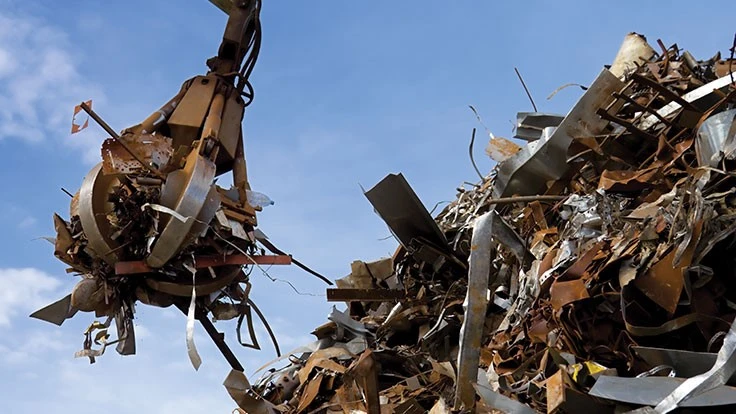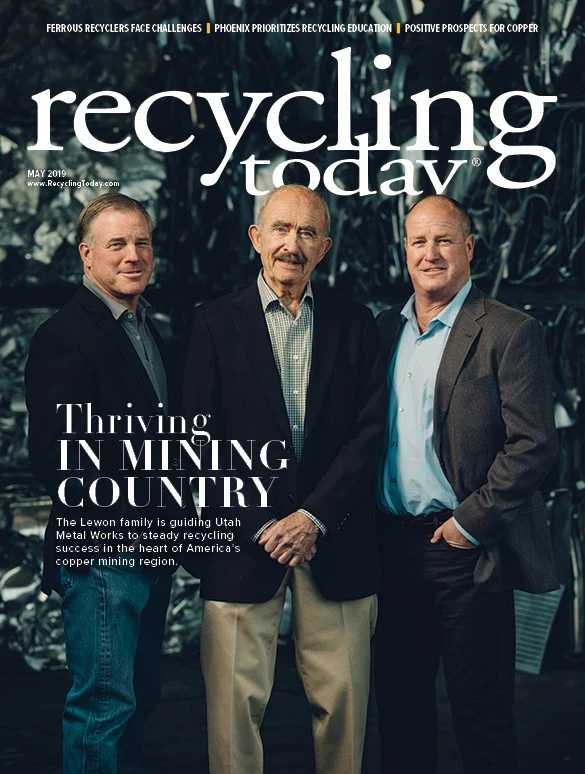
Dreamstime.com

© Isabel Poulin - Dreamstime.com
Presentations in addition to off-the-record conversations at ISRI2019 pointed to a ferrous scrap sector that is benefiting from consistent material flows and (to some extent) pricing but also facing looming issues that could signal trouble ahead.
The convention, hosted in April by the Washington-based Institute of Scrap Recycling Industries (ISRI), attracted some 3,000 people to the Los Angeles Convention Center.
Some of the recyclers who gathered shopped for needed equipment, while others came to strike up new trading opportunities or possibly to seek out new talent to hire in what many described as an increasingly tight labor market.
A change in the weather
Late February and early March in the ferrous market offered a price rebound to sellers, as buyers sought scrap after severe winter weather in many parts of the country had constricted supply.
That price rebound occurred just as the weather cleared, however, bringing iron and steel scrap from demolition projects, spring cleanups and ambitious peddlers into North American scrap yards.
The result was a price drop in April followed by rumors of additional downward price pressure heading into the early May buying period.
Lower scrap prices were likely to widen the spread between the price of scrap and that of finished steel, which was another topic of conversation at ISRI2019 and at a workshop on ferrous contract trading held in Los Angeles at the same time as the convention.
Joe Eckelman, a Pittsburgh-based senior pricing specialist at S&P Global Platts, spoke at the workshop, hosted by Houston-based Mobius Risk Group. He said 2018 saw nearly unprecedented spreads between prices for ferrous scrap and for finished hot-rolled coil (HRC) steel.
The spread rose from its usual $270-to-$330 per ton range to more than $500 during parts of 2018, Eckelman said, adding that the healthy electric arc furnace (EAF) steel sector in the United States should “drive the need for prime scrap, direct-reduced iron (DRI) and hot briquetted iron (HBI) in the future.”
A presentation prepared by ISRI Director of Commodities Joe Pickard for the organization’s board members summarized improved overseas demand for U.S. ferrous scrap in 2018, with the more than 15.6 million metric tons shipped rising by 13.75 percent compared with 2017.
Initial signals from the export market in 2019, however, are not as promising, with Fastmarkets AMM reporting in April that January 2019 ferrous scrap export volumes were down nearly 21 percent compared with January 2018, according to data from the U.S. Department of Commerce.
Recyclers attending ISRI2019 reported a “wait and see” attitude as being common among overseas buyers, with one recycler wondering whether such buyers would buy on the April dip or wait to see if prices fall lower in May.
By mid-April, media reports pointed to increased buying activity off the East Coast by Turkish mills, ideally adding at least a floor to the market if not an outright spark.
The spring market, like that of the previous 15 months, was largely staying within a $350-to-$400 per ton range (for prime grades, lower for others) that has defined a period of relative stability for scrap processors.
The relative lack of pricing drama has allowed recyclers to consider and talk about some wider industry issues, which include transportation woes, labor market difficulties and the future of family businesses.
Considering where and who
At ISRI2018 in Las Vegas, transportation issues were front and center, with the association devoting a morning keynote session to the topic. That session considered rail, trucking and personnel issues, all of which remained topics of conversation at ISRI2019.
A recycler from the mid-Atlantic region says working with the market dominant railroad in his region remained a source of discord for his company. He characterized it as a relationship where he can believe few if any of the promises for cars or service the railroad makes to him.

If the railroad in question is having staffing problems, it would not be alone, presenters and attendees at ISRI2019 said. The association held a morning keynote session on the topic of workforce development, and the Spotlight on Ferrous featured comments from Portland, Oregon-based Schnitzer Steel Industries CEO Tamara Lundgren that focused in part on the topic.
Lundgren urged scrap recyclers to make their workplaces healthy and safe, saying that was necessary to compete with warehouses and fulfillment centers to employ younger people seeking work. She also urged attendees to broaden their “talent search” for new employees, casting a “wider net” to include women, veterans and formerly incarcerated people. Lundgren also remarked that new technologies were likely to lead to automation replacing jobs that “no one is interested in doing.”
Immigrants always have played a role in the scrap industry, Lundgren said, noting that Schnitzer was founded by Russian immigrant Sam Schnitzer. She expressed support for “open borders,” which she said are “needed in a tight labor market.”
In the management offices of scrap companies, family business owners regularly are faced with the question of how and whether to keep a privately held company within the family.
ISRI2019 presenter Vince Pappalardo, who works in the Chicago office of Cleveland-based investment banking firm Brown Gibbons Lang & Co., said transitioning ownership in a family business can become more complicated with each succeeding generation, especially when the number of shareholders or stakeholders increases “and the objectives can be different for each.”
He said some younger generations may not have an interest in their parents’ companies, though in 2009 and after, when other career options were limited, many “new college graduates joined the family business and found they liked it.”
Even when there is an “obvious” heir to take over, Pappalardo said, “sometimes that heir is not ready,” meaning company owners and outside advisors might need to conduct a search for executive talent.
For owners who know they want to sell, a complication can arise between maintaining confidentiality and also wishing to “shop” the company to a range of potential buyers. Pappalardo said a technique he preferred is to contact a dozen or so privately held firms that maintain confidentiality to conduct a “controlled auction [by] talking to a small number of people at a high level.”
As ferrous scrap processors try to chart their own futures, the near term could depend on economic and trade conditions.
The fog of (trade) war
Global trade issues and decisions being made in Washington, Beijing and other world capitals provided another topic of conversation at ISRI2019.
In his presentation, Pappalardo said immediately after President Trump began imposing tariffs on imported steel, ferrous scrap sellers initially recognized “significant upward momentum in pricing.”
That initial boost has tapered away, however, but recyclers might yet see conditions that “push some mills to capacity,” causing a potential “difficulty in sourcing scrap” and another price boost, Pappalardo said.
Counter tariffs imposed by China, Turkey and other nations, however, could mean ferrous scrap exporters who have relied heavily on selling to those nations may “begin selling more into the U.S. market,” either because of favorable pricing or a lack of export demand, he said. This would provide a counterweight to higher scrap prices.
In a separate session, Jeffrey Weiss of the Washington-based law firm Venable LLP said the Section 232 national security tariffs on imported steel and aluminum have resulted in more than 4,600 requests for exclusions or exemptions. Of those, he said, more than 4,000 have been granted, while about 630 have been denied.
The final form and potential passage of the United States-Mexico-Canada Agreement (USMCA), designed to replace the North American Free Trade Agreement (NAFTA), also will affect scrap flows and steel production. Weiss said the Trump administration has proposed raising the U.S. content for vehicles that can be labeled as “Made in the U.S.A.” from 62.5 percent to 75 percent. The content rule changes also would require 70 percent of the steel and aluminum in such vehicles to be U.S. made.
The effects of cross-border trade talks are likely to remain of interest to ferrous scrap recyclers throughout the U.S. but especially to those near a seaport or near a land border with Canada or Mexico.

Explore the May 2019 Issue
Check out more from this issue and find your next story to read.
Latest from Recycling Today
- BMW Group, Encory launch 'direct recycling’ of batteries
- Loom Carbon, RTI International partner to scale textile recycling technology
- Goodwill Industries of West Michigan, American Glass Mosaics partner to divert glass from landfill
- CARI forms federal advocacy partnership
- Monthly packaging papers shipments down in November
- STEEL Act aims to enhance trade enforcement to prevent dumping of steel in the US
- San Francisco schools introduce compostable lunch trays
- Aduro graduates from Shell GameChanger program





